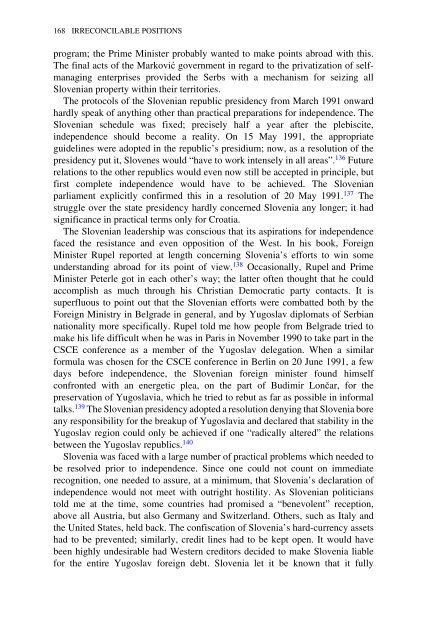Yugoslavia: A History of its Demise - Indymedia
Yugoslavia: A History of its Demise - Indymedia
Yugoslavia: A History of its Demise - Indymedia
You also want an ePaper? Increase the reach of your titles
YUMPU automatically turns print PDFs into web optimized ePapers that Google loves.
168 IRRECONCILABLE POSITIONS<br />
program; the Prime Minister probably wanted to make points abroad with this.<br />
The final acts <strong>of</strong> the Marković government in regard to the privatization <strong>of</strong> selfmanaging<br />
enterprises provided the Serbs with a mechanism for seizing all<br />
Slovenian property within their territories.<br />
The protocols <strong>of</strong> the Slovenian republic presidency from March 1991 onward<br />
hardly speak <strong>of</strong> anything other than practical preparations for independence. The<br />
Slovenian schedule was fixed; precisely half a year after the plebiscite,<br />
independence should become a reality. On 15 May 1991, the appropriate<br />
guidelines were adopted in the republic’s presidium; now, as a resolution <strong>of</strong> the<br />
presidency put it, Slovenes would “have to work intensely in all areas”. 136 Future<br />
relations to the other republics would even now still be accepted in principle, but<br />
first complete independence would have to be achieved. The Slovenian<br />
parliament explicitly confirmed this in a resolution <strong>of</strong> 20 May 1991. 137 The<br />
struggle over the state presidency hardly concerned Slovenia any longer; it had<br />
significance in practical terms only for Croatia.<br />
The Slovenian leadership was conscious that <strong>its</strong> aspirations for independence<br />
faced the resistance and even opposition <strong>of</strong> the West. In his book, Foreign<br />
Minister Rupel reported at length concerning Slovenia’s efforts to win some<br />
understanding abroad for <strong>its</strong> point <strong>of</strong> view. 138 Occasionally, Rupel and Prime<br />
Minister Peterle got in each other’s way; the latter <strong>of</strong>ten thought that he could<br />
accomplish as much through his Christian Democratic party contacts. It is<br />
superfluous to point out that the Slovenian efforts were combatted both by the<br />
Foreign Ministry in Belgrade in general, and by Yugoslav diplomats <strong>of</strong> Serbian<br />
nationality more specifically. Rupel told me how people from Belgrade tried to<br />
make his life difficult when he was in Paris in November 1990 to take part in the<br />
CSCE conference as a member <strong>of</strong> the Yugoslav delegation. When a similar<br />
formula was chosen for the CSCE conference in Berlin on 20 June 1991, a few<br />
days before independence, the Slovenian foreign minister found himself<br />
confronted with an energetic plea, on the part <strong>of</strong> Budimir Lončar, for the<br />
preservation <strong>of</strong> <strong>Yugoslavia</strong>, which he tried to rebut as far as possible in informal<br />
talks. 139 The Slovenian presidency adopted a resolution denying that Slovenia bore<br />
any responsibility for the breakup <strong>of</strong> <strong>Yugoslavia</strong> and declared that stability in the<br />
Yugoslav region could only be achieved if one “radically altered” the relations<br />
between the Yugoslav republics. 140<br />
Slovenia was faced with a large number <strong>of</strong> practical problems which needed to<br />
be resolved prior to independence. Since one could not count on immediate<br />
recognition, one needed to assure, at a minimum, that Slovenia’s declaration <strong>of</strong><br />
independence would not meet with outright hostility. As Slovenian politicians<br />
told me at the time, some countries had promised a “benevolent” reception,<br />
above all Austria, but also Germany and Switzerland. Others, such as Italy and<br />
the United States, held back. The confiscation <strong>of</strong> Slovenia’s hard-currency assets<br />
had to be prevented; similarly, credit lines had to be kept open. It would have<br />
been highly undesirable had Western creditors decided to make Slovenia liable<br />
for the entire Yugoslav foreign debt. Slovenia let it be known that it fully
















